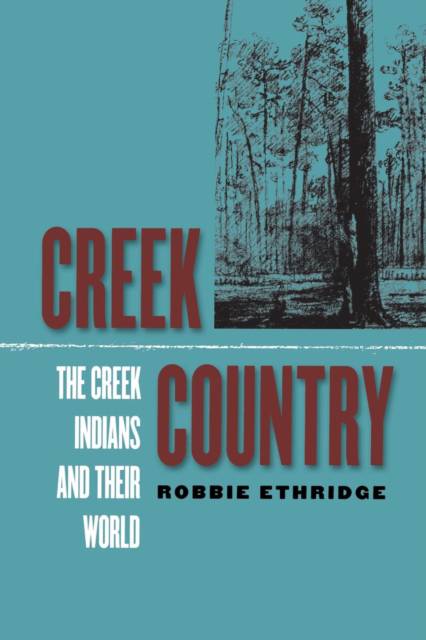
Door een staking bij bpost kan je online bestelling op dit moment iets langer onderweg zijn dan voorzien. Dringend iets nodig? Onze winkels ontvangen jou met open armen!
- Afhalen na 1 uur in een winkel met voorraad
- Gratis thuislevering in België vanaf € 30
- Ruim aanbod met 7 miljoen producten
Door een staking bij bpost kan je online bestelling op dit moment iets langer onderweg zijn dan voorzien. Dringend iets nodig? Onze winkels ontvangen jou met open armen!
- Afhalen na 1 uur in een winkel met voorraad
- Gratis thuislevering in België vanaf € 30
- Ruim aanbod met 7 miljoen producten
Zoeken
€ 44,95
+ 89 punten
Omschrijving
Reconstructing the human and natural environment of the Creek Indians in frontier Georgia, Mississippi, Alabama, and Tennessee, Robbie Ethridge illuminates a time of wrenching transition. Creek Country presents a compelling portrait of a culture in crisis, of its resiliency in the face of profound change, and of the forces that pushed it into decisive, destructive conflict.
Ethridge begins in 1796 with the arrival of U.S. Indian Agent Benjamin Hawkins, whose tenure among the Creeks coincided with a period of increased federal intervention in tribal affairs, growing tension between Indians and non-Indians, and pronounced strife within the tribe. In a detailed description of Creek town life, the author reveals how social structures were stretched to accommodate increased engagement with whites and blacks. The Creek economy, long linked to the outside world through the deerskin trade, had begun to fail. Ethridge details the Creeks' efforts to diversify their economy, especially through experimental farming and ranching, and the ecological crisis that ensued. Disputes within the tribe culminated in the Red Stick War, a civil war among Creeks that quickly spilled over into conflict between Indians and white settlers and was ultimately used by U.S. authorities to justify their policy of Indian removal.
Ethridge begins in 1796 with the arrival of U.S. Indian Agent Benjamin Hawkins, whose tenure among the Creeks coincided with a period of increased federal intervention in tribal affairs, growing tension between Indians and non-Indians, and pronounced strife within the tribe. In a detailed description of Creek town life, the author reveals how social structures were stretched to accommodate increased engagement with whites and blacks. The Creek economy, long linked to the outside world through the deerskin trade, had begun to fail. Ethridge details the Creeks' efforts to diversify their economy, especially through experimental farming and ranching, and the ecological crisis that ensued. Disputes within the tribe culminated in the Red Stick War, a civil war among Creeks that quickly spilled over into conflict between Indians and white settlers and was ultimately used by U.S. authorities to justify their policy of Indian removal.
Specificaties
Betrokkenen
- Auteur(s):
- Uitgeverij:
Inhoud
- Aantal bladzijden:
- 369
- Taal:
- Engels
Eigenschappen
- Productcode (EAN):
- 9780807854952
- Verschijningsdatum:
- 8/12/2003
- Uitvoering:
- Paperback
- Formaat:
- Trade paperback (VS)
- Afmetingen:
- 148 mm x 238 mm
- Gewicht:
- 503 g

Alleen bij Standaard Boekhandel
+ 89 punten op je klantenkaart van Standaard Boekhandel
Beoordelingen
We publiceren alleen reviews die voldoen aan de voorwaarden voor reviews. Bekijk onze voorwaarden voor reviews.











